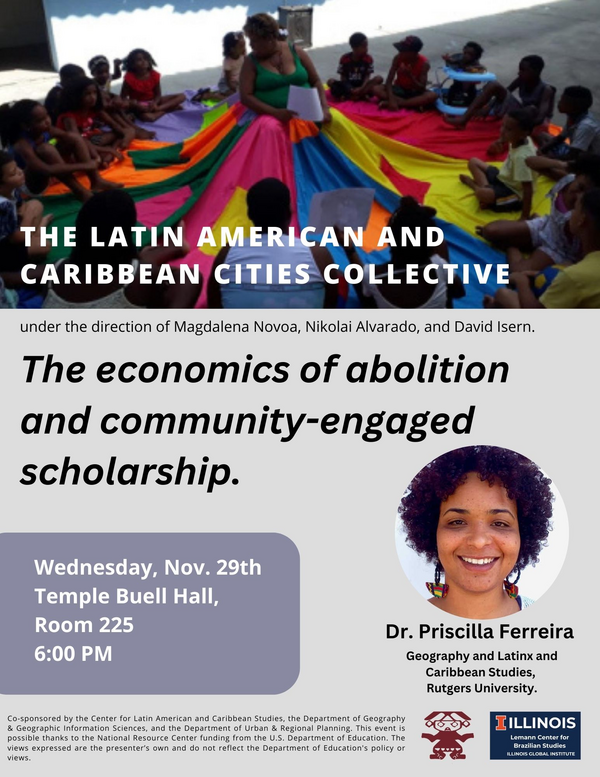The Economics of Abolition and Community-Engaged Scholarship

- Sponsor
- Latin American and Caribbean Cities Collective, co-sponsored by the Lemann Center for Brazilian Studies, Center for Latin American and Caribbean Studies, the department of Geography and Geographic Information Sciences and the department of Urban and Regional Planning.
- Speaker
- Dr. Priscilla Ferreira is an Assistant Professor of Geography and Latinx & Caribbean Studies at Rutgers University-New Brunswick. Her work and activism focus on Black solidarity economies, Black geographies, and community-engaged pedagogies and scholarship. She has been organizing with communities of color inside and outside of academia over the past twenty years and has collaborated in several popular education projects internationally. Dr. Ferreira is the coordinator of the English & Social Justice School, a language justice Black co-op that offers language training, interpretation, and translation services for social movements and creates opportunities for international education and political collaboration for/with Black grassroots activist/scholar/artists. She is a board member of Collective Diaspora, a new membership-based organization of Black cooperatives and Black-led co-op support organizations from across the African diaspora.
- Views
- 107
- Originating Calendar
- Lemann Center Events
The neoliberal university plays a crucial role in the global value chain of knowledge production. Under the dictates of the racial capitalist regime, the intellectual industrial complex functions to capture knowledge and turn knowledge producers into intellectual captives within the boundaries of disciplinary and institutional traps. Inside and outside of academia, communities of learning, especially those of color, have been experiencing the voracious extractivism of our material and intellectual resources, our leisure and organizing time, and our collective creative wealth. Solidarity economy organizing as a praxis of autonomy calls us to dismantle the colonial legacies and the neoliberal political economies of knowledge production.
How to embody ancestor-accountable, mutually uplifting, and community-nurturing political education? What new economic identities and economic possibilities might emerge when people experience mutual aid economies as a pedagogical praxis of autonomy and achievement? Dr. Ferreira will discuss experiences of mutual-aid economies in community-engaged research initiatives that she has co-created as a popular educator and community-engaged scholar. She will reflect on the role of scholars of economic justice in perpetrating or dismantling the intellectual industrial complex and suggest ideas on how to engage activist scholarship guided by the principles of solidarity economy and racial and epistemic justice.